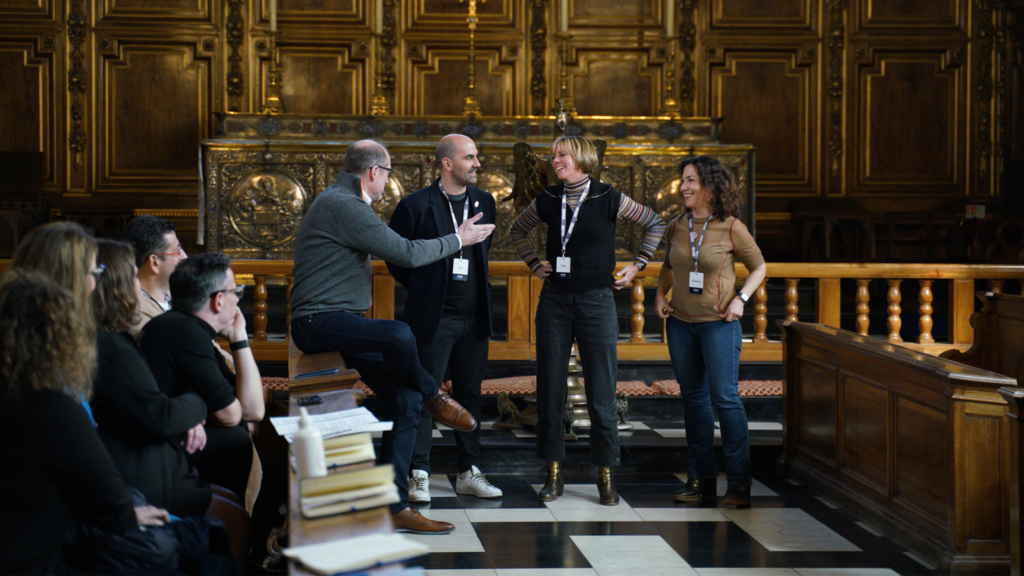I’ve been following Valerie Keller and Paul Polman since they launched Imagine. We made a Global GoalsCast episode around their work fostering “collective courageous behaviour” by corporations working together to achieve what no one of them might take on alone.
Thus , it was a pleasure to be invited by Imagine last April to join a cohort of remarkable individuals working (mostly) across the food system at the University of Oxford for an intensive week of learning, discussions and collaborative action.
The golden thread through the week was transformation – from personal to organisation to system.

A few moments.
Ian Goldin, Professor of Globalisation and Development spoke about the impossibility of untangling the complex, dynamic systems we have created and the challenge we face managing the hurtling pace of technological and social change. A former advisor to Nelson Mandela, he spoke about Mandela’s techniques for leading through a difficult transition. He recalled what a boon it was that Mandela was such an active listener. In order to get the most varied opinions out of people he would ‘keep asking and asking questions.’ Mandela would say, ‘I don’t know, I don’t understand’ to get people to share more. Goldin wondered how South Africa would be different today if he’d advised Mandela to stay for a second term.
Paul Polman spoke passionately about defending Unilever from takeover by Kraft Heinz. He did this in part by taking advantage of the network effect. Polman called everyone he knew, including some well known voices like Bono who spoke out on behalf of Unilever, drawing others to the cause. Ultimately Unilever was successful in repelling the bid. Polman spoke about why he actively wants to change the system which enables aggressive, unwanted takeovers because of the asset stripping, the loss of employment and the self-enrichment by the investors that comes as a result. He related the success of collective action to a current partnership effort – the Bridgetown Initiative which aims to reform development finance and is gathering pace.
Christine Lloyd, Director of Dynamic Systems Associates talked about the entropy of systems – the tendency of any system to grow, then fragment and decline over time. We are at the peak of the bell curve of the planetary system’s tolerance of our resource extraction. Without decisive intervention to create a new path, we’re heading for decline and fragmentation.
There was some personal – more reflective work as well. My friend Olivier Oullier, Neuroscientist and DJ spoke about embracing silence. He spoke about what happens when you go into an ‘anechoic chamber’ (a pod that absorbs all noises, sounds, and even electromagnetic waves). Some can hear their own heart beat. Many feel dizzy because of how unusual the experience is. Existing in silence can lower cortisol levels increase dopamine and seratonin. It can lower stress and improve the immune system. Depeche Mode is right, Enjoy the silence.
Some of the most powerful work was on a personal level with Perch Decote, who suddenly and unexpectedly passed away this week. He gave a number of gifts to the group that week – one of them was around being respectful of people’s time when asking for something. “Why is it not ok to steal someone’s wallet, but ok to steal their time?” Framing a conversation by asking permission allows the person you are speaking with to step into the conversation and honors their time. ‘I need to vent. Can you just hear it?’ ‘I need some coaching on a problem. Is now a good time?’ ‘I have a different opinion about that. Would you like to hear it?’ ‘I’m afraid you might hear this in a way other than I intend.’
I know in several weeks a new cohort will join Imagine in Oxford. I know they’ll enjoy the experience as much as I did.
I want to extend my heartfelt appreciation to the exceptional IMAGINE team, including Valerie Keller, Paul Polman, Wiebe Draijer , Kate Wilson , and Richard Mayfield. Their dedication fostered an environment of genuine open dialogue, knowledge exchange, and creativity.